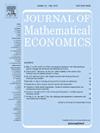准线性筛选问题的一般解决方案
IF 0.7
4区 经济学
Q3 ECONOMICS
引用次数: 0
摘要
我们提供了一种算法,用于解决难以分析的多维筛选问题。该算法是一种初等--二元算法,它交替优化委托人提取盈余的初等问题和给定盈余下交付给代理人的最优分配的二元问题。我们通过解决 (i) 一般垄断者价格歧视问题和 (ii) 当公民在多个维度上存在差异时涵盖所得税和储蓄税的最优税收问题来说明该算法。本文章由计算机程序翻译,如有差异,请以英文原文为准。
A general solution to the quasi linear screening problem
We provide an algorithm for solving multidimensional screening problems which are intractable analytically. The algorithm is a primal–dual algorithm which alternates between optimizing the primal problem of the surplus extracted by the principal and the dual problem of the optimal assignment to deliver to the agents for a given surplus. We illustrate the algorithm by solving (i) the generic monopolist price discrimination problem and (ii) an optimal tax problem covering income and savings taxes when citizens differ in multiple dimensions.
求助全文
通过发布文献求助,成功后即可免费获取论文全文。
去求助
来源期刊

Journal of Mathematical Economics
管理科学-数学跨学科应用
CiteScore
1.70
自引率
7.70%
发文量
73
审稿时长
12.5 weeks
期刊介绍:
The primary objective of the Journal is to provide a forum for work in economic theory which expresses economic ideas using formal mathematical reasoning. For work to add to this primary objective, it is not sufficient that the mathematical reasoning be new and correct. The work must have real economic content. The economic ideas must be interesting and important. These ideas may pertain to any field of economics or any school of economic thought.
 求助内容:
求助内容: 应助结果提醒方式:
应助结果提醒方式:


